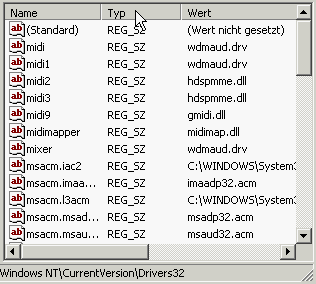Ah, “undocumented features.” Here’s my least favorite MIDI and audio “feature” in Windows: since Windows 2000, the operating system imposes an arbitrary limit of ten 32-bit audio (wave) and MIDI device drivers on the system. These are actually 10 driver entries in the Registry, so you don’t have to have 10 USB keyboards to hit the limit — almost anyone is suscpetible to the problem. Many USB devices now install both an audio and a MIDI device driver. “Virtual devices” like the Pamela virtual audio cable for Skype or the excellent MIDI Yoke interapp MIDI driver take up entries. You can even use up entries by installing device driver updates, or (now this gets truly absurd) just by plugging your device into a different USB port. Internal devices are affected as well as USB devices, and sometimes entries get used up in apparent spontaneous ways.
Here’s how to find, and fix, the problem (thanks to a tutorial from RME; picture below):

The symptoms: This is my favorite part. You’ll just wind up installing a driver, and it won’t work, often without an error message. Or you’ll find yourself constantly re-installing hardware drivers, because the system “forgets” the driver between reboots.
Diagnosis: If you select Properties of the device (e.g., via the Device Manager), you should see a status of “Driver enabled but not functioning properly.” The driver is installed, but Windows can’t use it, in other words.
Cure: RME has a set of instructions for editing your Registry. When I’ve run into this problem, as when I couldn’t get MIDI Yoke to operate, I turned to RME’s suggestions and got things working again. Registry editing seems to be the only way to go; as always, backup your machine before messing with Registry values because a typo can hose your system. (In fact, I wouldn’t have found the RME instructions at all had it not been for the copious support information at the MIDI-OX site. Do yourself a favor: if you ever use MIDI, install MIDI-OX and MIDI Yoke today, and read the installation instructions completely before plowing ahead!)
Will it ever get fixed? So far, it hasn’t. Windows 2000 through the current release of Windows XP still have this problem. Now the big question is, can Microsoft get it fixed in Vista? If they don’t, they’re going to hear it from me (and you, too, now). The only good news here is that 64-bit drivers are unaffected, and PCs are clearly going 64-bit — but that’s not really an excuse, is it, especially since a lot of the aforementioned drivers run in 32-bit and a single device can wind up filling up a whole host of slots.